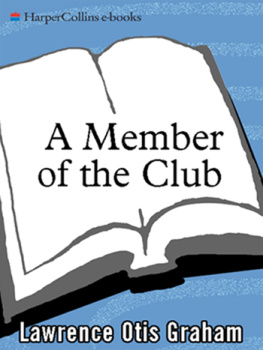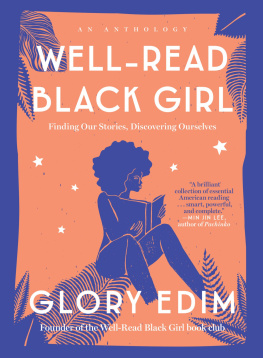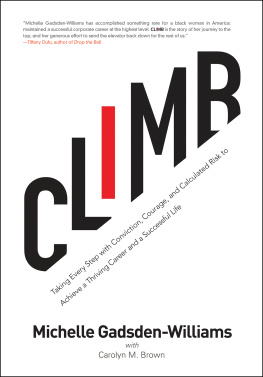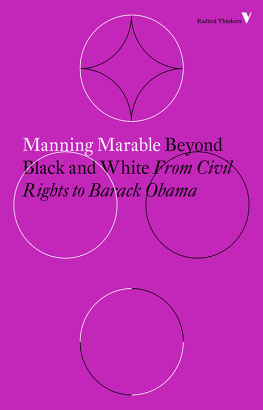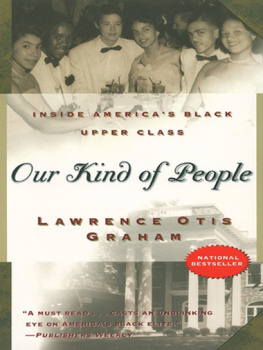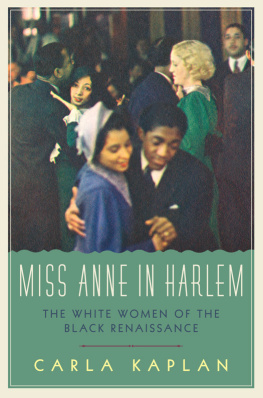I met in the halls of Harkness Commons .
B ECAUSE THIS BOOK was so long in the writing, and relied on so many resources, there are a great number of individuals who have won my deepest gratitude. Among them are friends, advisers, and confidants who have sent me articles, recommended books, shared ideas, and introduced me to people I needed to consult. They are Margaret Morton, Elisabeth Radow, James Grasfield, Brad Roth, Dauna Williams, Teresa Artis, Andrea and Keith Heyward, Kim Jenkins, Un Suk Ko, Teresa Clarke, Adam Cohen, Diane Faber, Alex Coleman, Brenda Boudreaux Coleman, Christopher Fearon, Nelson Smith, Joe McDaniel, Dolores Harris, Leora Thompson, Nancy Marx Better, Steven Price, Jamin Raskin, Carlton Long, David Jones, Steve and Marilyn Emanuel, Anne and Albert Gottlieb, Lawrence and Laura Gordon, David Goldhill, Naoko Fuji, Derrick Bell, Rosabeth Moss Kanter, Barry Stein, Alan Dershowitz, Claire Wachtel, Ted Lee, Randall Kennedy, Dominique Richard, Luke Yang, Gail Busby, Lou Schuster, Bruce Wilson, Marguerite Gritenas, and Jay Ward.
I want to thank Minerva Reed, Cecelia Drewry, Jim Merritt, John McPhee, Joyce Carol Oates, Cynthia Reynolds, Jody Seward, Pamela Hut, Roy Oppenheim, Stephen Pfleger, Pamela Henderson, Anita Jackson, Jordan Horvath, and Lawrence Hamdan, who befriended me during a very important period of my own racial soul-searching.
And although I have told them many times before, I can never sufficiently express my appreciation for Sarah Weddington and Ron Brown, who introduced me to two White House administrations and who demonstrated a sincere interest in the black professionals they hired, as well as the millions of citizens they served.
Others who have, directly and indirectly, offered advice and support on this work are Anne and Wyatt Tee Walker of Harlems Canaan Baptist Church; William Howard of the New York Theological Seminary; Dr. Mirian and Donald Hinds, who introduced me to the movers and shakers in Harlem; Sen. Carol Moseley-Braun and Rep. William Gray, who were kind enough to discuss the issues of politics, race, and media during an intimate and unhurried breakfast; Percy Sutton; David Garth; Mark and Deni Green; Lucille Frand; Searcy O. Grahame; Leotha and Earlene Graham; Blanche and James Edwards; Earl and Phyllis Walker; Dorothy and Victoria Holloway; James and Robin Benerofe; John Jacob; Susan L. Taylor; Hazel Dukes; Edward Kosner; Tom Prince; Elliot Hoffman; Denzel Washington; Debra Chase; Michael Halpern; Courtenay Valenti; Jordan Schaps; Ted Hardin; Fawzia Mustafa; Irma Watkins-Owens; Edward Bristow; as well as my friends from the NAACP, Jack & Jill, the Drifters, the Westchester Clubmen, and the Links.
I want to thank the following libraries for providing me with reference texts, periodicals, and quiet spaces in which to gather data and construct these essays: Howard Universitys Moorland-Spingarn Research Center; the libraries of Princeton University, Harvard University, Fordham University, Pace University, and Columbia University; the Joint Center for Political and Economic Studies; as well as White Plains Public Library, Scarsdale Public Library, Greenburgh Public Library, Beverly Hills Public Library, Los Angeles Public Library, and the Schomburg Center for Research in Black Culture of the New York Public Library.
I am immensely grateful for the time and interest contributed to this project by my friends and advisers at ICM: Esther Newberg, Amanda Beesley, and Sloan Harris. They, along with the editorial guidance of Gladys Carr, Cynthia Barrett, Elissa Altman, and Deirdre OBrien, helped me weave these essays into a manuscript that fully captures my view of race in America.
For fighting off the demons and for shaping my first impressions of what it meant to share in the rich heritage and culture of the black community, I thank my parents, Richard and Betty, for their patience and their courage. And for being my first best friend, I thank my brother, Richard.
And finally, I thank Pamela, who, along with her intellectual honesty, consultants eye, three-books-per-week reading addiction, and deep spirituality, has helped me find my own moral compass and reach for places Id never been and never knew existed.
L AWRENCE O TIS G RAHAM
New York, New York
A S A BLACK professional in America it is sometimes so difficult to find true acceptance in either the black or the white communities that I often feel like an outsider to both; alienation seems to be the price of living with a foot in each world.
When my black peers and I share the daily experiences that we face at work, in our neighborhoods, on vacation, in church, or even in local restaurants, we inevitably find ourselves commenting on the mounting feelings of frustration and alienation that accompany our roles as people who have become a threat to elements in both the black and the white communities.
Most of us were raised in integrated or totally white neighborhoods. We attended predominately white colleges and graduate schools, and we are employed by white-owned-and-run institutions where we work in positions that are almost exclusively held by whites. Our daily contact with other black people is sometimes so peripheral that our emotional and intellectual ties to the larger black community become weakened and we begin to be perceived as outsiders by our black brethren. The black community, which is primarily not professional and not middle or upper class, looks at us as sellouts who have abandoned the black agenda. When we do attempt to involve ourselves with the agenda of the larger black community we are accused of expressing views that are outside the parameters of authentic black concerns.
Similarly, we are alienated from the white community by daily reminders that while we can shop in the same stores, work in the same firms, and live in the same neighborhoods as our white peers, our acceptance will be challenged as we are shadowed by store clerks, passed up by cabdrivers, ignored by bosses who are looking for protgs, and rejected by clubs that offer networking opportunities.
The twelve essays in this book examine the black professional class and its ongoing dilemma as a group that has no real homeabandoned or ostracized by other blacks and resented or rejected by whites.
Relying on historical research, my experiences as a corporate attorney and a college professor, and the anecdotes of others, I examine the widening gap within the black community between professional blacks and others; the continuing, subtle racism of some white institutions; and the ambivalence that blacks living with a foot in each world feel when the two communities collide.
For example, Whos Running This Race?. The Black Leaders We Like and the Ones We Dont assesses how black leadership has failed black people by not recognizing that the black agenda needs to include more than just the challenges of the black poor. In this essay, I discuss the grave problems of the NAACP, the tendency of the black community to anoint ill-equipped or corrupt spokespeople, and how those more capable black leaders and civil rights groups should reorganize if they intend to remain effective. Black leaders and their organizations must implement what I call Socioeconomically-Based Black Leadership, which would serve black people by dividing the black populations problems along economic lines. Socioeconomically-Based Black Leadership recognizes that the interests of a black corporate executive who earns $125,000 a year and lives in the suburbs cannot be met by the same black leader who is focused on solving the equally compelling problems of a black inner-city single parent earning $10,000 a year who lives in public housing. Up to this point, the black agenda has almost exclusively been dictated by the needs of the black poor and, while those needs are basic and compelling, they should not eclipse the cries heard from other blacks in need.

